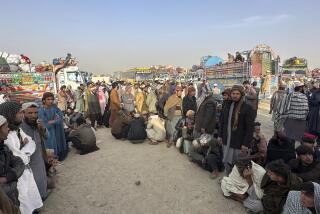France’s doubts on Afghanistan a boon for Taliban
Reporting from Jaipur, India, and Paris —
President Nicolas Sarkozy’s announcement Friday that France was suspending joint combat and training programs and considering an early withdrawal from Afghanistan may be a sign the Taliban’s efforts to discourage its foes from continuing a long and unpopular war are paying off.
Sarkozy said his country would review its role in the U.S.-led war after four French soldiers were killed and more than a dozen wounded by an Afghan soldier who turned on them Thursday in Kapisa province, just north of Kabul, the capital.
The possible departure of France’s 3,600 troops could weaken Washington’s hand as it tries to launch talks with the Taliban insurgents in the hope of forging a peace deal before the Americans leave by the end of 2014.
Thursday’s attack on the French was the second in three weeks. On Dec. 29, an Afghan soldier killed two French troops in the eastern part of the country. The deaths bring to 82 the number of French troops killed in the decade-long war.
Sarkozy is vying for reelection April 22 against rivals who say they would move more quickly to end France’s participation in the war. His Socialist Party opponent, Francois Hollande, said Friday that if elected, he would pull out all French troops by the end of the year.
Sarkozy said he would decide on a possible withdrawal after a previously scheduled meeting with Afghan President Hamid Karzai next week. “The French army is not in Afghanistan to be shot at by Afghan soldiers,” he said.
Defense Minister Gerard Longuet and Adm. Edouard Guillaud, the head of the military chiefs of staff, were dispatched to Afghanistan to investigate the incident.
Karzai said he was deeply saddened by the attack. “France has been generous to provide extensive assistance to Afghanistan over the past 10 years,” he said.
The North Atlantic Treaty Organization said in a statement in Kabul that a suspect had been arrested, but it gave no details. Military trainers say deadly clashes between Afghan and foreign troops are often caused by perceived personal slights or cultural gaffes. But even when it is not responsible, the Taliban is quick to claim credit, seeking to create more dissent among rank-and-file troops and boost its standing in the eyes of ordinary Afghans.
The Taliban’s overall objective, analysts say, is to raise the cost of remaining militarily involved in Afghanistan.
“Divide and conquer is clearly the No. 1 part of their strategy,” said Jean-Charles Brisard, a Paris-based expert on terrorism and financing of terrorism. “They’ve repeatedly ... said their strategy is to harass foreign troops to hasten their withdrawal, which they would accomplish if Sarkozy is serious about this.”
Rohan Gunaratna, head of the International Center for Political Violence and Terrorism Research in Singapore, said Sarkozy’s actions would boost Taliban morale.
U.S. officials have been worried privately for months that support is waning among their allies for keeping combat troops in Afghanistan until the end of 2014. They hope to keep the alliance unified until a NATO meeting in May, when they want to announce that they are speeding up the transition to a strategy more focused on training Afghan forces and turning more areas of the country over to Afghan control.
The killing of the French soldiers deepened doubt about the vetting of Afghan recruits, and about whether the Taliban is infiltrating their ranks.
U.S. officials refrained from criticizing Sarkozy’s announcement, saying such decisions must be made by individual governments. Voters in most countries that have troops in Afghanistan are unhappy with the rising toll of the war.
Didier Andre, 48, a Paris bank employee, said France needed to get out now. “The whole history of foreign intervention in Afghanistan has always ended badly,” he said. “Why should we imagine it would be any different this time?”
In addition to Hollande, who is considered Sarkozy’s main rival in the election, far-right candidate Marine Le Pen has also raised the prospect of a quick withdrawal. “If security conditions are not clearly established, then we should think about pulling the French army out,” she said.
“Clearly, we are in the process of training an Afghan army of which a certain number of members are not loyal to France,” she said.
Didier Francois, a defense specialist for Europe 1 radio, said French forces were in an “extremely difficult zone” in Afghanistan. If Sarkozy intends to pull them out, he said, it will take nearly a year to make sure roads are clear and that the danger of bombs and ambushes has been removed.
Francois Heisbourg, a special advisor at the Paris-based Foundation for Strategic Research, said he believed an early pullout was necessary but it would leave the U.S. and remaining allies with the difficult problem of how to patrol Kapisa.
“It’s true that if we decide to pull out materiel this year, we will be forced to stop missions in that region,” he said. “As a result, NATO operations will be threatened. The discussions [about this] will be very important. Everything is possible and much depends on what the Americans want.”
Times staff writer Magnier reported from Jaipur, India, and special correspondent Willsher from Paris. Staff writer David S. Cloud in Washington contributed to this report.
More to Read
Sign up for Essential California
The most important California stories and recommendations in your inbox every morning.
You may occasionally receive promotional content from the Los Angeles Times.










